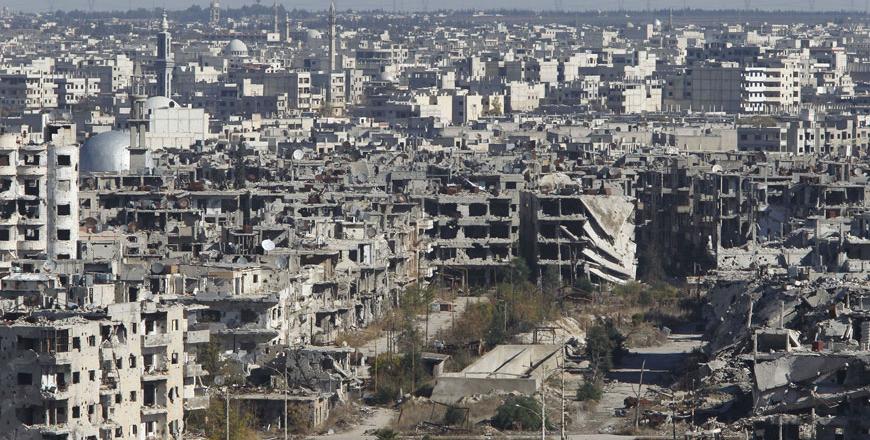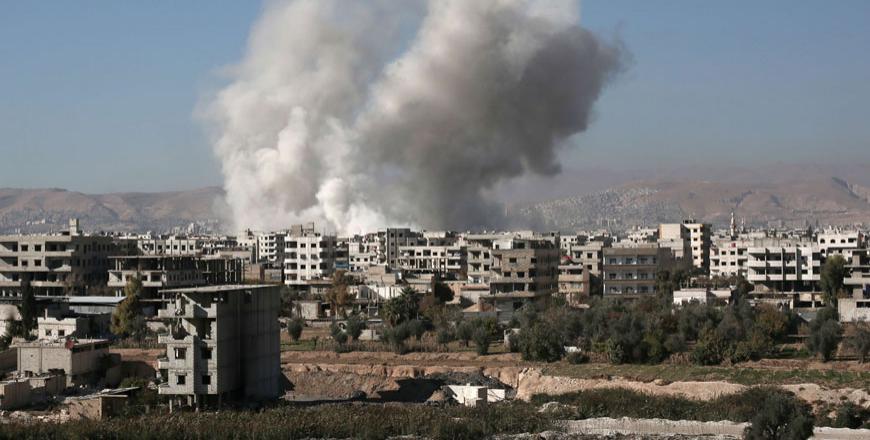You are here
Syrian opposition in Riyadh for difficult unity talks
By AFP - Dec 08,2015 - Last updated at Dec 08,2015

A general view shows Al Qosour neighbourhood of Homs, Syria, on Tuesday. Humanitarian aid has reached a besieged rebel-held area in the central Syrian city of Homs, part of a local ceasefire deal that is to include the withdrawal of opposition fighters, the Syrian Observatory for Human Rights said (Reuters photo by Omar Sanadiki)
RIYADH — Syria's splintered opposition was gathering in Saudi Arabia on Tuesday for difficult discussions on forming a united front in potential peace talks with President Bashar Assad.
The Saudi-organised talks, due to start on Wednesday, mark the first time representatives of some of Syria's various political and armed opposition factions come together since the outbreak of the country's conflict in March 2011.
The goal is to form a unified bloc for talks with Assad that world powers hope can be held before January 1.
But divisions have already emerged over the reported participation of some groups, including Ahrar Al Sham, allied with Al Qaeda's Syrian affiliate Al Nusra Front.
And armed entities described as “terrorist” organisations, such as Al Nusra and the Daesh terror group, were not invited.
The powerful Saudi-backed Jaish Al Islam (Army of Islam) rebel force, which includes hardline Islamists, announced Monday it would send two delegates.
Riyadh insists invitations were extended to “all factions of the moderate Syrian opposition” including from all parties, sects and ethnic groups.
But Kurdish organisations, including the recently formed and US-backed Syrian Democratic Forces, which includes Kurds, Arab Sunni Muslims and Christians fighting Daesh, were not invited.
Kurdish groups, including the leading Democratic Union Party, have organised their own two-day conference starting Tuesday.
Diplomatic push
Previous attempts by regional and other international powers have failed to unite the diverse opposition groups, whose differences have long reflected the struggle for influence among the countries supporting them.
But there has been a growing diplomatic push for a resolution to the conflict, which has killed more than 250,000 people and forced millions from their homes.
Last month, top diplomats from 17 countries — including key backers and opponents of Assad — agreed in Vienna on a fixed calendar that would see a transition government set up in six months and elections within 18 months.
Some 100 delegates are expected for the talks on forming an opposition bloc to negotiate with Assad on the transition.
One delegate involved in organising the gathering said it would begin around 0600 GMT Wednesday and run for two days.
The meeting would be chaired by Abdulaziz Sager, a Saudi who heads the independent Gulf Research Centre in Geneva.
The first day would focus on political questions, including the general contours of a potential settlement, while Thursday would be dedicated to discussing “terrorism, a ceasefire and reconstruction”, the delegate said.
About 20 members of the Istanbul-based National Coalition, the main opposition grouping, are taking part in the meetings.
Charles Lister, visiting fellow at the Brookings Doha Centre, told AFP the talks aim “to go some way towards establishing an opposition negotiating team”.
The Riyadh meeting is also “an attempt to establish a unified political structure between the recognised political opposition coalition and the armed opposition as a whole,” the analyst said.
Syria’s political opposition, including the National Coalition, has long been accused of being out of touch with forces on the ground.
‘Difficult and risky’
National Coalition member Samir Nashar said the talks would be “difficult and risky” as they could leave the opposition more divided than ever.
He said the aim was to “agree on a common and clear position concerning the future of Syria, the transition and the stance on [the fate of] Bashar Al Assad.”
Speaking of “core differences” over Assad, Nashar said he feared “some groups close to states supporting the regime could demand that Assad stays during the transition period”.
“This risks causing the failure of the meeting,” he said.
Groups supported by the United States, Saudi Arabia and Qatar are demanding Assad’s rapid departure, a condition that Iran and Russia oppose.
The Syria-based opposition tolerated by the regime argues that Assad’s fate should be decided by the Syrian people.
Despite the sidelining of many rebel groups, the deputy head of the National Coalition, Hisham Marwa, said there was some hope of moving forward at the talks.
“I am optimistic about the presence of military and political figures. This is the real opposition... Those absent are a small number who will not affect the equation,” he said.
Leaders of the six-nation Gulf Cooperation Council are also converging on Riyadh for their annual summit Wednesday.
Related Articles
DUBAI — Syrian opposition groups gather in Saudi Arabia Tuesday to unify their stance ahead of potential talks with the regime of President
BEIRUT — One of the main Syrian opposition blocs said Wednesday that it was unlikely to attend Geneva peace talks this week unless progress
RIYADH — Syria's main opposition groups agreed at unprecedented talks Thursday to negotiate with President Bashar Assad's regime but insiste













